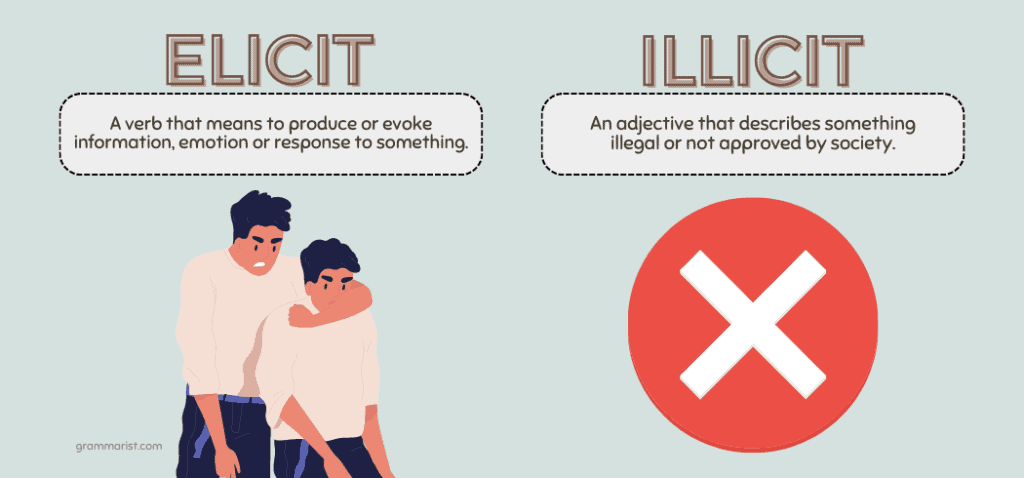Homophones are words pronounced the same but have different meanings. They can be confusing to native English speakers and especially to anyone new to the English language.
Elicit and illicit are great examples of two words that confuse many people due to how similar they sound. Unless you know their definition and hear them in context, you might be frustrated by their use.
Learn about how to define them and use them in sentences in this article.
What Is the Difference Between Elicit and Illicit?

Elicit and illicit are practically homophones. Homophones are pronounced the same but have different definitions. Elicit and illicit are, in fact, considered true homophones by some dictionaries, even though they have slight pronunciation differences. This confusion is due to various accents people place on the words.
However, elicit is pronounced with a long e, while illicit is pronounced with a short i.
They also have different parts of speech and are used in very different contexts when used in a sentence.
Elicit is a verb that means to produce or evoke information, emotion or response to something. Illicit is an adjective that describes something illegal or not approved by society.
Definition of Elicit
As mentioned above, elicit is a verb, meaning it describes an action. When you are in the act of eliciting something, it means you are drawing out or evoking something from somebody else. For example, you might elicit emotion, a response, an opinion or information from somebody.
Using Elicit in a Sentence
- Despite her best attempts, she never could elicit a response from him concerning the vacation dates, so she went without him.
- My instructor elicited responses from each of the students concerning their thoughts on the new building.
- His actions elicited an immediate response from the audience, and they quickly put an end to his emotional outbursts by muting the microphone.
Origins of Elicit
Elicit is from the 17th century and derived from the Latin elicitus, a past participle of elicere, meaning to draw out or draw forth. It originally meant to “bring forth or bring to light” and is still true to its spelling and definition to this day.
Definition of Illicit
Illicit is an adjective, meaning it describes or details a noun and is generally located directly before a noun in a sentence. Illicit describes something illegal or highly disregarded in society and considered inappropriate or unacceptable. For example, an illicit affair or illicit relationship is something you could be involved with, or perhaps you have illicit drugs in your possession.

Using Illicit in a Sentence
- You cannot have any illicit items in your possession when entering the park; these include drugs, alcohol or tobacco products.
- Her illicit behaviors were the main reason many of her friends began to distance themselves from her through the years.
- Despite the business’s success, she decided to resign due to her disapproval of the illicit practices she witnessed the owner partake in.
Origins of Illicit
Illicit originated in 1500 from the Old French word illicite, meaning unlawful or forbidden. It is from the Latin illicitus, meaning not allowed or illegal. It assimilated from combining in-, meaning opposite of, and licitus, meaning lawful.
Let’s Review
Although some people consider them homophones, meaning they sound the same but have different meanings, elicit and illicit do have slightly different pronunciations. Elicit starts with a long e sound and is a verb, meaning to evoke a response or emotion from something.
Illicit is an adjective used to describe an illegal practice or activity or highlight something society does not approve of.
Both are well used today despite their confusing similarities.

Comments are closed.